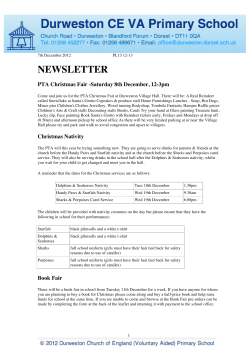
Document 158170
Whale and Dolphin Conservation Society WDCS is the global voice for the protection of whales, dolphins and their environment The Dolphin Diploma Quiz Question 3 - Linked activity ideas for teachers and pupils Question and Answer Memory Game Photocopy the following questions and answers onto card, but choose a different colour card for the answers. Cut out the boxes. Children lay all the cards face down and take turns to turn two cards face upwards to see if they can match the Q’s and A’s. If they get a matching pair they keep them. If not, they turn them face down again and play resumes. The winner is the player with the most cards when there are no more left face down. WDCS UK | Brookfield House | 38 St Paul Street | Chippenham | Wiltshire SN15 1LJ | tel: 0870 870 5001 | email: education@wdcs.org | reg. charity no: 1014705 Page 2 - Dolphin Diploma question 3 ideas Whale and Dolphin Conservation Society WDCS is the global voice for the protection of whales, dolphins and their environment Q. What is one of the biggest threats to dolphins around the world? Q. How are dolphins’ habitats being destroyed? Q. How many whales and dolphins get caught and killed accidentally each year in fishing nets? Q. Why are noises in the oceans a problem for dolphins? Q. Why is loss of habitat so terrible for dolphins? Q. How do dolphins sleep? WDCS UK | Brookfield House | 38 St Paul Street | Chippenham | Wiltshire SN15 1LJ | tel: 0870 870 5001 | email: education@wdcs.org | reg. charity no: 1014705 Page 3 - Dolphin Diploma question 3 ideas Whale and Dolphin Conservation Society WDCS is the global voice for the protection of whales, dolphins and their environment Q. What sounds do dolphins use to communicate? Q. What is echolocation? Q. Why are there fewer and fewer fish in the seas for dolphins to eat? WDCS UK | Brookfield House | 38 St Paul Street | Chippenham | Wiltshire SN15 1LJ | tel: 0870 870 5001 | email: education@wdcs.org | reg. charity no: 1014705 Page 4 - Dolphin Diploma question 3 ideas Whale and Dolphin Conservation Society WDCS is the global voice for the protection of whales, dolphins and their environment A. Dolphins use echolocation (sounds) to communicate, navigate and find food. A noisy ocean means they cannot understand each other or find their way around. A. Because if the dolphins’ habitat is no longer suitable, they will move away to a different area. The new area may not have enough fish for the dolphins or it may not be a safe area for the dolphins to live in. A. Scientists believe that dolphins sleep by shutting down half of their brain and cat-napping. They need to stay awake with part of their brain so they can continue to breathe. A. Humans are mainly responsible. We pollute the rivers and oceans and develop areas where dolphins live.? A. Loss of habitat A. Approximately 300, 000 – 400,000 every year. WDCS UK | Brookfield House | 38 St Paul Street | Chippenham | Wiltshire SN15 1LJ | tel: 0870 870 5001 | email: education@wdcs.org | reg. charity no: 1014705 Page 5 - Dolphin Diploma question 3 ideas Whale and Dolphin Conservation Society WDCS is the global voice for the protection of whales, dolphins and their environment A. It is the use of sonar to find out where objects are. Dolphins send out sounds and listen to the echo, this tells them exactly what is around them and where their prey is. A. All around the world people love to eat fish. Commercial fisheries catch the fish to sell to people. So many fish are being taken from the oceans that in some places there aren’t enough for the dolphins to eat. A. They use many sounds including clicks, whistles and squeaks WDCS UK | Brookfield House | 38 St Paul Street | Chippenham | Wiltshire SN15 1LJ | tel: 0870 870 5001 | email: education@wdcs.org | reg. charity no: 1014705 Page 6 - Dolphin Diploma question 3 ideas Whale and Dolphin Conservation Society WDCS is the global voice for the protection of whales, dolphins and their environment Teacher’s Answers 1. Q. What is one of the biggest threats to dolphins around the world? A. Loss of habitat 2. Q. How are dolphins’ habitats being destroyed? A. Humans are mainly responsible. We pollute the rivers and oceans and cause noise and traffic. 3. Q. How many whales and dolphins get caught and killed accidentally each year in fishing nets? A. Approximately 300, 000 – 400,000 every year. 4. Q. Why are noises in the oceans a problem for dolphins? A. Dolphins use echolocation (sounds) to communicate, navigate and find food. A noisy ocean means they cannot understand each other or find their way around. 5. Q. Why is loss of habitat so terrible for dolphins? A. Because if the dolphins’ habitat is no longer suitable, they will move away to a different area. The new area may not have enough fish for the dolphins or it may not be a safe area for the dolphins to live in. 6. Q. How do dolphins sleep? A. Scientists believe that dolphins sleep by shutting down half of their brain and cat-napping. They need to stay awake with part of their brain so they can continue to breathe. 7. Q. What sounds do dolphins use to communicate? A. They use many sounds including clicks, whistles and squeaks. 8. Q. What is echolocation? A. It is the use of sonar to find out where objects are. Dolphins send out sounds and listen to the echo, this tells them exactly what is around them and where their prey is. 9. Q. Why are there fewer fish in the seas for dolphins to eat? A. All around the world people love to eat fish. Commercial fisheries catch the fish to sell to people. So many fish are being taken from the oceans that in some places there aren’t enough for the dolphins to eat. WDCS UK | Brookfield House | 38 St Paul Street | Chippenham | Wiltshire SN15 1LJ | tel: 0870 870 5001 | email: education@wdcs.org | reg. charity no: 1014705
© Copyright 2025





















